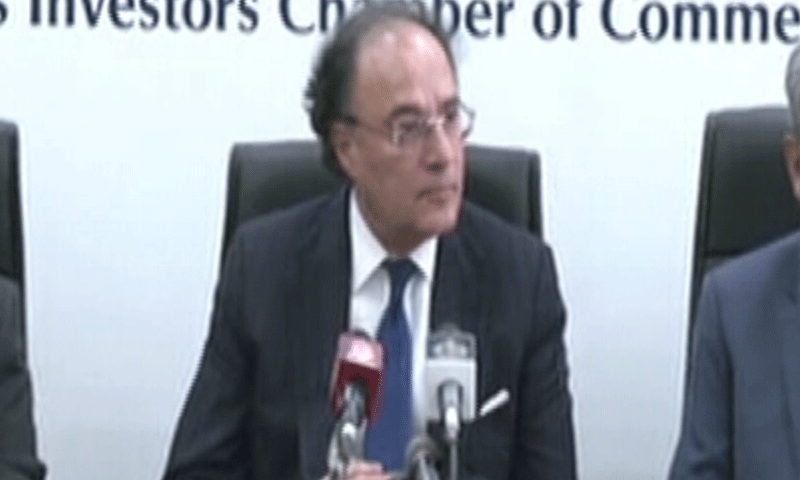Finance Minister Muhammad Aurangzeb on Monday said that the additional powers granted to the Federal Bureau of Revenue (FBR) had nothing to do with income tax.
The expanded enforcement powers for the FBR include the authority to block high-value financial transactions by non-filers — such as vehicle and property purchases, investment in securities and mutual funds, and opening certain prestigious bank accounts — along with powers to seal unregistered business premises, confiscate goods and recover taxes from firms, including those in the public sector. The move has generated criticism from many quarters.
Addressing the matter in a press conference in Karachi today, Aurangzeb said, “I think there is something to understand about what the existing law was at the time. The first thing to understand is that it has no relation to income tax. This whole issue is a sales tax fraud issue.”
The finance minister added that in the original law, Inland Revenue Service officers had the authority to arrest, and it was the opinion of the government that additional safeguards should be developed in this regard.
He described the lengthy process of taking this bill into the standing committees and the “detailed discussions” on each clause in the Senate finance committee, the National Assembly and finally the parliament before its approval, including feedback from the Pakistan Bar Council’s vice chairman.
Aurangzeb requested that people read the new safeguards that were developed, pointing out that of the 10-12 sections, six of them addressed sales tax fraud “because they are more serious offences vis a vis tax fraud versus the other six”.
He also added that the power would only be exercised if the value of the sales tax fraud was over Rs50 million, and that it would be exercised on a commissioner level, with the permissions being acquired from a three-member FBR board.
“This is not something parliament has approved without thinking it through,” he added. “A lot of thought has gone into it.”
The finance minister also highlighted two areas in which banks could lend further support and assistance in achieving sustainable growth in the economy, focusing on the areas of privatisation and the restructuring and revival of sick units. He said that there were currently 24 state-owned enterprises that were given to the privatisation commission, adding that “banks can play a very important role in this, and they should”.
He stressed that there were many possible external reasons for an industry to struggle, such as macroeconomic factors, commodity prices, inflation and high interest rates, which impair their ability to pay. Aurangzeb called for banks to join with sponsors to revive the sick units, saying that this would be “a very big pillar of [Minister-in-Charge for Industries and Production] Haroon Akhtar’s industrial policy (…) where banks can play a very major role”.
“I am glad that the banking sector in Pakistan is stepping up and helping the economy to grow as we go forward,” he said.
Aurangzeb added that macroeconomic stability “is not an end in itself”.
“It was a very big issue that [foreign investors’] dividends were stuck here, their profits were unable to be repatriated, there was difficulty in opening their letters of credit,” he said, expressing appreciation for the acknowledgement of the “substantial improvement” in the last 12-18 months.
“It is very important for a foreign investor that when they bring their capital, they have the assurance that ‘we can take this back at any time (…) without any prohibitions’. So to me, this is basic hygiene,” he said. “If existing investors are not satisfied, then bringing further investment in the future is very difficult. So I think we’ve come a long way from that perspective.”
Aurangzeb also stated that he had invited Faysal Bank President and CEO Yousuf Hussain and Communications Minister Abdul Aleem to Islamabad, partly to see the FBR transformation for themselves, which involved the simplification of processes and automation of procedures, and partly to bring their own outstanding issues for discussion with the whole team.
“It is very important to re-establish the credibility and trust of our tax authority in this country,” he said.
The finance minister also requested that everyone present at the conference look at the new simplified salaried class tax form that had been published on the FBR website and provide feedback as to whether it was “simplified enough”.
“The first form that used to be filled out had about 800 rows, and complicated codes,” he said, adding that now there were eight screens in total.
He added, “We have only started with the salaried class. We will take this to small traders, and then we will take it to SMEs (small and medium-sized enterprises). So that whatever we can facilitate in simplifying the process, we will.”
Aurangzeb added that, as of his information from two days prior, about Rs75bn in sales tax refunds had been given within this month alone, and that meetings were happening regularly for the purpose of taking the country’s economic stability towards sustainable growth, stressing that his focus was on sustainability.
“What finance minister does not want a big increase in growth?” he said, but warned against repeating “boom and bust cycles” in the country, where a “sugar rush” of chasing consumption-led growth would lead the country “back to square one”.
Addressing a structural solution to economic issues, he said, “My personal opinion is that whatever things we can deregulate, we should,” referring to the success of rice and maize crops.
“Wherever the government gets a credit, that is where there are issues,” he said. “So over a period of time, I think we should leave it to the private sector and demand and supply, and I think that to me is a structural solution.”
